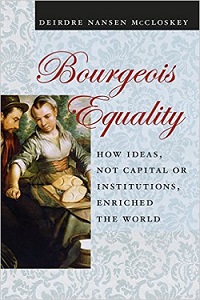
Jonah Goldberg has an excellent post on “Social Darwinism”, in which he builds on a potential imprecision by Deirdre McCloskey, who published a piece in the Wall Street Journal abridging her new, wonderful book “Bourgeois Equality“.
Goldberg singles out this quotation:
Intellectuals on the political right, for instance, looked back with nostalgia to an imagined Middle Ages, free from the vulgarity of trade, a nonmarket golden age in which rents and hierarchy ruled. Such a conservative and Romantic vision of olden times fit well with the right’s perch in the ruling class. Later in the 19th century, under the influence of a version of science, the right seized upon social Darwinism and eugenics to devalue the liberty and dignity of ordinary people and to elevate the nation’s mission above the mere individual person, recommending colonialism and compulsory sterilization and the cleansing power of war.
Then he comments:
McCloskey is speaking about intellectuals in a transatlantic context here, so it’s possible she’s talking about the German “right” – i.e. Nazis and their progenitors – when she’s talking about social Darwinism and eugenics. If that’s what she means, that’s a debate I’m happy to have given that book I wrote. But if she’s talking about America or even Britain, I think she basically gets this flatly wrong. “Social Darwinism” was a phrase invented by progressives – pro-eugenics progressives – to demonize laissez-faire capitalism. The notion that the 19th-century American “right” – at least as we understand the term in the Anglo-American tradition — believed in social Darwinism was almost entirely an invention of progressive statists and the 20th-century historian Richard Hofstadter.
Goldberg is certainly right. A recent book by Thomas Leonard, “Illiberal Reformers“, builds on that subject. Hofstadter’s “Social Darwinism in American Thought” is a beautifully written book, but by juxtaposing Herbert Spencer and William Graham Sumner to, so to say, the “nastier” kind of Social Darwinism, he aimed clearly aimed at discrediting laissez-faire. And it succeeded, if you think that Spencer, whose works are a treasure trove of arguments for any sincere libertarian (even if you just dig into “The Man Vs the State” and the marvelous “The Study of Sociology“, without entering the Synthetic Philosophy), was largely ignored by 20th century classical liberals, all afraid of the “Social Darwinist” stigma.
My only criticism of Goldberg is that I’m not sure he is right in crediting Deirdre with a faulty understanding of Spencer and his evolutionary approach. The piece in the WSJ is excerpted from the preface of the new book.
Let me quote what follows from the book, not the article (though they largely overlap):
Later, in European socialism and American Progressivism, the left proposed to defeat bourgeois monopolies in meat and sugar and steel by gathering under regulation or syndicalism or central planning or collectivization all the monopolies into one supreme monopoly called the state. In 1965 the Italian liberal Bruno Leoni (1913-1967) observed that “The creation of gigantic and generalized monopolies is [said by the left to be] precisely a type of ‘remedy’ against so-called private ‘monopolies.'”
While all this deep thinking was roiling the clerisy of Europe, the commercial bourgeoisie–despised by the right and the left, and by many in the middle, too, all of them thrilled by the Romantic radicalism of books like Mein Kampf or What Is to Be Done–created the Great Enrichment and the modern world.
It seems to me that Deirdre is clearly referring to the “German” right, not to the Anglo-Saxon one. Spencer would certainly not be an appropriate target of her, in fact–as Goldberg correctly points out–he was “a thoroughly McCloskeyan figure.”
On the top of that, neither Spencer nor William Graham Sumner are mentioned in “Bourgeois Equality”. But if you go back to “Bourgeois Dignity“, chapter 42, “Why liberty and dignity for ordinary people, in short, were the greatest externalities”, Deirdre self-identifies labels “her theme” as “the true liberal one”, and then a long list of “true liberals” follows. I have issues with some of the names Deirdre names (Giuseppe Mazzini? Really?), but Herbert Spencer is there, prominently mentioned in the McCloskeyan pantheon.

READER COMMENTS
Deirdre N. McCloskey
May 29 2016 at 5:08am
Dears,
I had in mind, actually, the earlier British right, in particular Carlyle, admirable in some ways but in his views on, say, slavery, a proto-racist—as his friend J. S. Mill complained. David Levy and Sandra Peart have done wise work on this strain in British thought. Africans and the Irish, for instance, were portrayed c. 1840 as monkeys.
But if course, my dear Jonah, I knew about the eugenics of the Progressives. I reckon all sides, “left” and “right,” were racists c. 1910, with appalling results on the left in, for example, Sweden from 1930-1970.
Regards,
Deirdre
Typo corrected: “1070” changes to “1970.”–Econlib Ed.]
Don Boudreaux
May 29 2016 at 9:12am
Alberto,
Nicely done. Just fyi – and as you probably know – Deirdre reviews Thomas Leonard’s new book in the current (July 2016) issue of Reason.
By the way, I went to the comments section of Goldberg’s post (where Deirdre herself is among those who weigh in). It’s very depressing to encounter the bigotry and ignorance that some commenters reveal themselves to have about Deirdre.
Comments are closed.